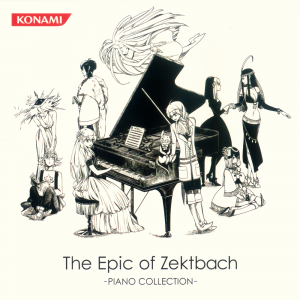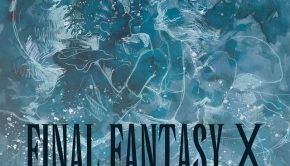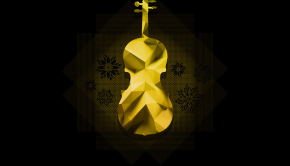The Epic of Zektbach Piano Collection
 |
Album Title: The Epic of Zektbach Piano Collection |
| Record Label: Konami Digital Entertainment |
|
| Catalog No.: GFCA-194 |
|
| Release Date: March 24, 2010 |
|
| Purchase: Buy at CDJapan |
Overview
The Epic of Zektbach -Piano Collection- is a piano arrangement album with arrangements of songs from Tomosuke Funaki’s first two albums under his Zektbach pseudonym, with arrangements for all of the pieces from The Epic of Zektbach -Ristaccia-, along with three new tracks. Arrangements and performances are handled by a variety of musicians but there is a good standard of quality on the album, and arrangements present a good range in difficulty and complexity.
Body
For the pieces from the pop’n music and beatmaniaIIDX games the piano versions stay very close to the album versions in structure and arrangement. So while the great “Overture ~Ristaccia~”, “Turii ~Phanta rei~”, “Blind Justice” and “Apocalypse” have no surprises in their arrangements, simply condensing all of the original elements to the piano is enough to separate the two versions, making both worthwhile. It helps that the arrangements are still fairly difficult and complex, played with plenty of emotion and dynamics by pianists who are all very skilled. “Shamshir Dance” is a highlight of these tracks, having a virtuosic arrangement accented by crystal clear playing. The reduced arrangement is much less cluttered than the original, helping it shine. “ZETA” has the biggest facelift of these tracks and is another highlight, bringing out the background arpeggiations in slower, gentle waves with a mournful air. Unlike the ever-shifting original track, this one generally keeps the same feeling throughout to its own benefit.
All of Funaki’s new tracks from Ristaccia also make it to this album. The opener, “Ark Ouroboros” has an identical structure to the original, and its dizzying sound makes a good transition to the piano, even if it loses a bit of its impact. “Aria te’Laria” and “Holy Kingdom of Noigllado” are improved in their piano counterparts, having less rigidness than the originals and more feeling. The arrangements also do a great job of highlighting the lighter feel of “Aria te’Laria” and the more sombre notes of “Holy Kingdom”. “L’erisia (Primal logic)” loses the strength of its harsh strings, but gains the cold feeling of the piano in its quick passages, which move along with a Baroque dexterity that contrasts wonderfully with its more dramatic passages. “Nyoah’s Sword Dance” is fairly transcriptive, retaining most of the original chaotic piano (which made up the bulk of the track to begin with). It’s the least essential of all of the arrangements, not having anything of note separate from the original, but it’s one hidden among the many other great arrangements.
The slower tracks from Ristaccia are more transcriptive in nature, being based off of tracks that were largely instrumental solos to begin with. “fragment”, “Rufina”, and “The Abandoned Island” are all very similar to their original counterparts, with a bit of an extension on the later two tracks. The pieces are simple and calm but they are played sensitively, giving the pieces more feeling than their artificial originals for the most part. The reverb of the piano also makes the pieces more warm. “fragment” in particular is much more beautiful with its flutters of high notes, and the reduced, deliberate pace of “The Abandoned Island” makes the track even more moving than it already was.
Three new tracks are written for the album, each still a piano solo. “village hidden in the mist” and “innocent wish” are slower sombre tracks in line with those from Ristaccia. “village hidden in the mist” is a lighter piece but still with a touch of sadness, while “innocent wish” starts dreamily and ends more heavily. It’s more of the same as far as this album goes, but that is by no means bad. “Masinowa” (which would later be the titular track for the next Zektbach album) introduces a new holy land with heavy use of the pentatonic scale for a more oriental feel. It’s mostly a subdued affair with a repeated melody that isn’t quite as memorable as the others on the album, but it’s a decent track. These new tracks don’t add much to the album, but they don’t detract from it either.
Summary
The Epic of Zektbach -Piano Collection- is a wonderful piano album that provides a great companion to the original album. It’s true that the arrangements are the most part quite similar to the originals, but the switch to the piano alone is enough to make the pieces feel fresh, and the performances of the pieces are skillful, highlighting the emotive compositions where the originals at times fell flat due to their artificial sounds. The arrangements here are simple or complex where called for, with some pieces even quite virtuosic. Some arrangements are merely passable, but they all add to the complete experience of the album. Overall, this is a must-have for a fan of Funaki’s Zektbach work, and a great acquisition for anyone who enjoys other piano game music.
Do you agree with the review and score? Let us know in the comments below!
4.5
Posted on March 19, 2015 by Christopher Huynh. Last modified on March 20, 2015.














